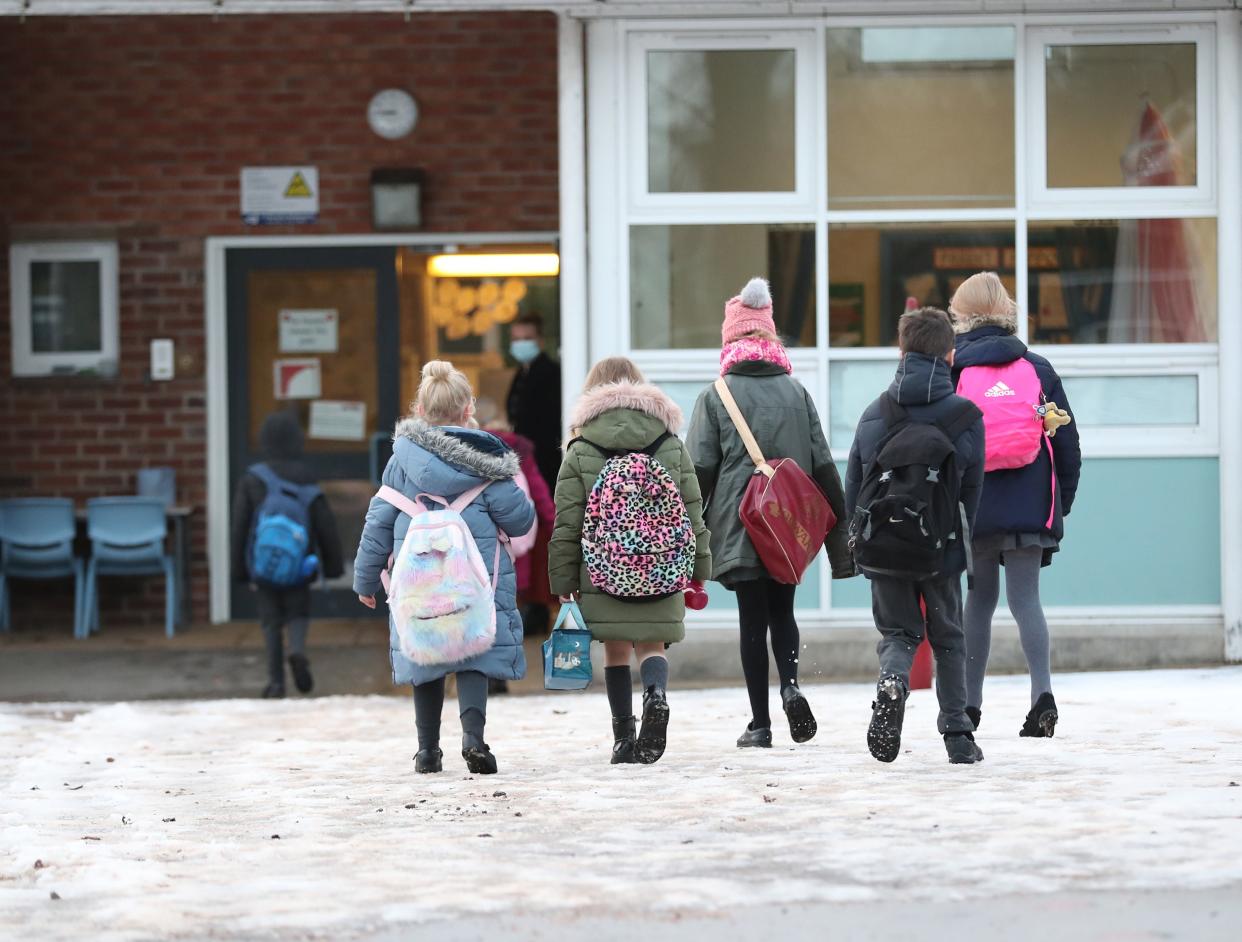I’m not concerned about my children ‘catching up’ when schools go back – I just want to make sure they’re okay

‘Research has shown that emotional wellbeing is fundamental for academic attainment’
(PA)For the first time since my kids started school, I attended a “virtual parents’ evening” this week. All of us – me, their dad, the teacher – were in different buildings, connected by the dim glow of our screens.
“There’s been so much for them to process,” my four-year-old’s lovely, warm and energetic reception teacher said. “I’m not too worried about them ‘catching up’ with lessons. Our main priority is finding out how they’re feeling – and making sure they’re okay.”
And there, in an instant, a tsunami of relief. For parents, this past year has been defined by almost unbearable worry. Not just because of the pandemic, and concerns about how this extended disruption to our children’s education has (and may continue) to affect our children, but also because of the untold effects of isolation on their mental and emotional wellbeing.
As adults, we can try to understand, and identify, when we’re struggling – we can note the ways in which we’re not coping, and (hopefully) reach out to loved ones, or for professional support. But our children can’t always identify the tumult of emotions in the same way.
Sometimes, their worries manifest themselves bodily – my nine-year-old daughter has complained of a “tummy ache” almost daily since the pandemic began. When I took her to the doctor, there was (physically, at least) nothing wrong. But that doesn’t mean it wasn’t “real”, or that she wasn’t feeling unwell. What’s most likely is that she was missing her friends, and simply didn’t know how to name it.
So it comes as some comfort to see that a group of experts in child development have written to the education secretary, Gavin Williamson, calling for measures prioritising the emotional wellbeing of children when England’s lockdown eases – rather than asking teachers to “catch up” on learning time for kids via summer schools, extended school days and shorter summer holidays.
“This spring and summer should not be filled with extra lessons,” PlayFirstUK – which includes 15 child psychologists and education specialists – said in their letter. “Children, teachers and parents need time and space to recover from the stress that the past year has placed on them.”
I couldn’t agree more – though I’ll admit that I can only speak from the perspective of a parent of two young children, who don’t face any vital exams at this point in their state education. It must be very different for those with teenagers on the brink of GCSEs and A-levels, looking with trepidation to university or the workplace.
But I’m not alone. I saw this tweet from a fellow parent, which put it perfectly: “I know Gavin Williamson wants to focus on getting discipline back in schools but my five-year-old just told me if you touch or hug someone at school you will get coronavirus and die, so maybe we should focus on helping them feel safe again first.”
In some ways, I feel fortunate that my kids are so young – my son had only recently started at primary school when we went into the first lockdown. Many countries don’t even start children in formal education until they are seven. But that doesn’t mean they, too, don’t worry about Covid-19.
My kids spent the majority of the first national lockdown last summer outside, drawing chalk rainbows on the pavement, building forest forts at the local park, swapping screens occasionally for “a swimming pool” (a hole they dug in the mud, before filling it with water) and – I’ll confess – mostly being left to their own devices, given that I was juggling home-schooling with a demanding job (and arguably failing at the former).
Still, I felt it far more important that they were being creative with paints, building blocks and plain old-fashioned dirt, than setting them on a rigorous routine with lessons via a home-schooling app. Kids are naturally inquisitive – they’ll seek out the things that interest them, and will naturally gravitate to creative pursuits when they’re bored. It can be good for them to get bored: that way, imagination lies.
That’s not to say they didn’t do any schoolwork at home. My daughter, a dab hand with an iPad, got on with it herself, the “school day” punctuated with the occasional bellow for snacks, and with me calling out to “check in”: “Are you doing your schoolwork? Yes? Good.”
Frankly, I simply couldn’t manage any more than the briefest supervision of their education – not when I was busy working at the same time to pay the bills for them to stay warm, dry and fed. Parents, particularly mothers, are often expected to be able to “do it all”. What this pandemic has shown, most clearly, is that this is impossible.
The thing is, with schools about to return in England tomorrow, I’m still not panicking about it. Research has shown that emotional wellbeing is fundamental for academic attainment – educational psychologists warn that stressed, anxious children find it difficult to learn, and promoting wellbeing can boost academic outcomes.
So, if teachers spend the coming few weeks or months doing nothing but making sure our kids are feeling safe and happy – and, crucially, are given the chance to talk about what they’ve been through this past year, to help them process it properly – I’m all for it.
They might not be top of the class, but I’m not worried. They’ll catch up.
Read More
Gavin Williamson considering possibility of ‘five-term year’ as schools in England set to return
Back to school: Everything you need to know about Covid testing and face mask rules

 Yahoo News
Yahoo News 
